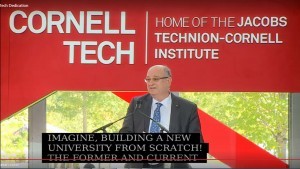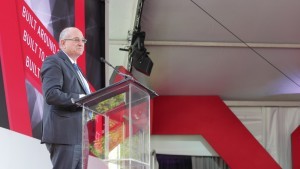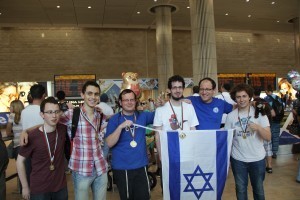Professor Peretz Lavie, President of Technion-Israel Institute of Technology

“A once-in-a- generation opportunity, to build a new university in N.Y.C.”, those were the words of Mayor Bloomberg in his invitation to top tier universities. I used these words when I conveyed his magnificent idea to a group of Technion Deans. I asked them to prepare a proposal for a new graduate program in NY, tailor-made to the economic strengths of the city. Between you and me, while I emphasized that this was indeed a once in a life time opportunity, I also encouraged them that
“since we have a very slim chance of winning – be wild, use your imagination to build something original, new, out of the box.” And indeed they did.
Imagine, building a new university from scratch!
Prof. Skorton and now Prof. Polack and myself are eternally grateful to Mayor Bloomberg for giving us this incredible chance to fulfill every university president’s fantasy. This opportunity could not have come at a better time. One of the current most pressing issues facing universities and academic institutes world-wide,
is the search for the best means to adapt to the fourth industrial revolution – the digital revolution – the Machine Age.
Driven by the Internet of Things, Artificial Intelligence and the notion of robotics replacing human labor, our machines are exhibiting abilities they have never had before. Jobs in which productivity can be greatly improved by technology – are already in steep decline. Tasks that are standardized, repetitive, and involve patterns – can now be carried out a million times faster by algorithms. Companies are making more money and hiring fewer people.
But the positions that are irreplaceable by machines, no matter how intelligent, are those that require social intelligence, creativity & perception –
characteristics we aim to cultivate here at Cornell-Tech, alongside excellence in sciences and engineering.

Cornell and the Technion stood up to the challenge and came up with a new form of university. A university that is not only tailor made to the economy of NY, but is also designed to meet the challenges of the digital revolution.
Cornell Tech and the JTCI programs are unique. This is a revolutionary model for graduate-level technology education, removing traditional barriers between disciplines. It is rapidly establishing itself as a model academic institution for the second half of the 21st century.
Ladies and gentlemen, the campus we inaugurate today is built for the future. It will generate the next big ideas, new companies and talents that will fulfill mayor Bloomberg’s vision for New York. Our students will become immediate players in the 4th industrial revolution and will join New York’s vibrant economy.
With this magnificent campus, Cornell and the Technion are making a clear statement: practical knowledge, to paraphrase Ezra Cornell, is not inferior nor second rate to basic knowledge – they are the two sides of the same coin. The uniquely designed corporate co-location building will allow us to fuse academia and industry under the same roof. It will foster innovation and world-class research and start-ups for economic growth and for the public good.
To come full circle, I’d like to take one more opportunity to thank you so much, former mayor Michael Bloomberg, on behalf of the Technion and Cornell, for your vision, courage and generosity that have taken this incredible idea and made it into an incredible reality.
And in the words of a one-of-a-kind educator, Janusz Korczak,
“The one who cares for the future, plants wheat.
The one who cares for the years to come, plants trees.
The one who cares for future generations, educates people.”
credit: Cornell University CornellCast


